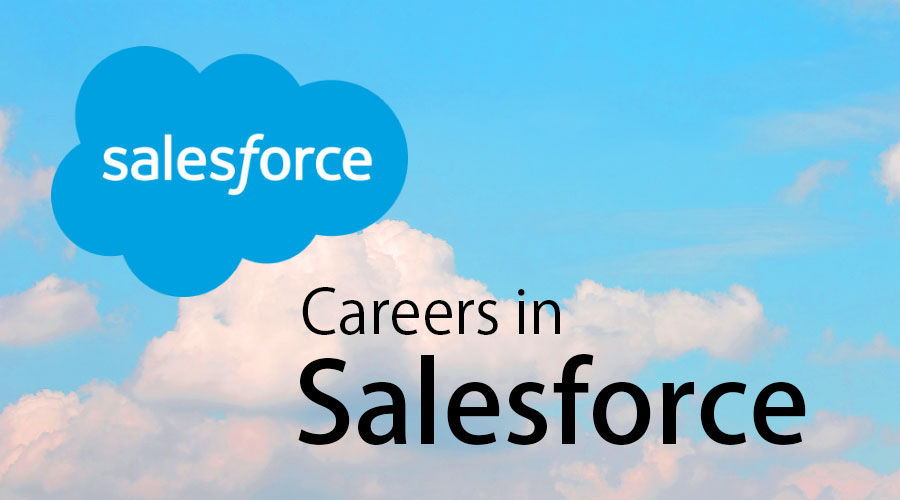Steps to Success: How to Start Your Career in Salesforce?
- sanasabirnet
- Apr 30, 2023
- 5 min read

Salesforce is a challenging yet rewarding career choice. The platform's various tools and services provide numerous career opportunities for individuals with different backgrounds and skills. Whether you want to be a Salesforce administrator, developer, consultant, or architect, many options are available.
Starting a career in Salesforce requires a deep understanding of the platform, its products, and its ecosystem. You must also determine your career path, obtain relevant certifications, gain hands-on experience, and connect with the Salesforce community.
This guide covers the essential steps for “How to start your career in Salesforce?” We'll begin with the basics of the platform and then explore the various career tracks available. Additionally, we'll discuss the critical skills you need to succeed, the importance of certifications, and effective ways to gain hands-on experience and network with the community.
This guide is perfect for beginners and those seeking to advance their careers in Salesforce, providing the knowledge and resources you need to succeed.
Importance of Salesforce in Today's business world
Salesforce is a widely used CRM platform with over 20% market share. Its powerful tools have revolutionized how businesses manage customer interactions, automate sales and marketing processes, and improve customer experiences.
The demand for skilled Salesforce professionals has skyrocketed, creating abundant career opportunities. This paragraph summarizes the essential steps to launch a career in Salesforce: learning the platform's basics, obtaining certification, acquiring practical experience, networking with the Salesforce community, and securing a job in the dynamic industry.
This will provide you with the knowledge and skills required to succeed in Salesforce, whether you're a new graduate, an experienced IT professional, or someone transitioning into a new career.
Understand the Different Salesforce Products

To succeed in a Salesforce career, it's crucial to understand the various products and how they function as a cohesive unit.
Salesforce has various products with unique features and capabilities. Knowing how to use them can make you a better Salesforce professional. Popular products include Sales Cloud, Service Cloud, Marketing Cloud, Commerce Cloud, and Einstein Analytics.
If you learn about these products and what they do, you can figure out which ones are important for your career goals and how to become an expert in them.
Determine Your Career Path in Salesforce
Consider your background, strengths, and goals for your Salesforce career path. There are jobs for developers, administrators, consultants, and analysts. Keep up with industry trends to discover new opportunities. Explore your options and set goals to create a path that matches your interests and leads to success in the Salesforce ecosystem.
1) Overview of different Salesforce roles.
Salesforce has several roles with different skills and duties. These roles include administrators, developers, architects, consultants, analysts, and project managers.
Administrators manage the platform, developers build applications, architects oversee solutions, consultants advise clients, analysts use data, and project managers coordinate implementations.
To plan your career, understand the roles that align with your strengths and interests, and stay up-to-date on industry trends and requirements, including certifications and product expertise.
2) Understanding the skills required for each role.
Salesforce roles have specific skills and qualifications you must understand to succeed. For example, a Salesforce developer needs programming skills, experience with Apex and Visual Force, and software development expertise.
Salesforce administrators require expertise in the platform, database management, and workflow automation. Meanwhile, Salesforce consultants need skills in communication, problem-solving, business process design, and customized solutions implementation.
To excel in the Salesforce ecosystem, it's crucial to recognize and enhance the necessary skills for your preferred position. By doing so, you can reach your full potential and become a valuable asset to the industry.
3) Identify your interests and strengths.
To begin a career in Salesforce, identify your interests and strengths first. Doing this will enable you to select a career path that suits your passions and utilizes your distinctive abilities.
Salesforce has various areas of specialization, including administration, development, consulting, marketing, and customer service. To determine your best fit, evaluate your strengths in problem-solving, communication, project management, and technical skills.
Think about what motivates you and what you like to do in your free time. Identify your interests and strengths to make informed decisions about the type of work and roles that would suit you in the Salesforce ecosystem.
Acquire Relevant Salesforce Certifications
Acquiring relevant Salesforce certifications is essential to building a successful career in this field. Salesforce offers a range of certifications that validate your knowledge and expertise in different areas of the platform, from administration and development to marketing and analytics.
By earning a Salesforce certification, you demonstrate to potential employers and clients that you have the skills and knowledge needed to excel in your role. Some of the most popular Salesforce certifications include;
Salesforce Certified Administrator.
Salesforce Certified Developer.
Salesforce Certified Marketing Cloud Consultant.
To acquire these certifications, you must pass an exam that tests your knowledge of the respective Salesforce product or service. Salesforce also provides training materials, study guides, and practice exams to help you prepare for the certification exams.
Investing in Salesforce certifications can enhance your resume, improve your job prospects, and open new career growth and development opportunities.
Gain Hands-on Experience in Salesforce
Gaining hands-on experience with Salesforce is crucial for anyone looking to build a career in this field. While theoretical knowledge and certifications are valuable, practical skills and experience, set you apart from other candidates and make you more attractive to employers.
There are several ways to gain hands-on experience with Salesforce, including building your own Salesforce projects, volunteering for non-profit organizations, participating in Salesforce user groups, and working on Salesforce projects for your current or future employer.
By gaining hands-on experience, you'll learn how to use Salesforce in a real-world setting, develop problem-solving skills, improve your communication and collaboration skills, and build a portfolio of Salesforce projects you can showcase to potential employers.
Networking and Job Search in Salesforce
Networking is crucial in any industry, and the Salesforce ecosystem is no exception. By connecting with other Salesforce professionals, joining user groups, attending events, and participating in online forums, you can expand your knowledge, gain valuable insights, and build relationships that can lead to job opportunities.
In addition, many job search resources are available within the Salesforce community, including job boards, recruiting agencies, and LinkedIn groups.
By leveraging these resources and building your professional network, you'll be able to stay up-to-date on the latest job openings, learn about new Salesforce projects and initiatives, and connect with potential employers who are looking for candidates like you.
Whether you're just starting your Salesforce career or looking to take the next step, networking, and job search are essential components of a successful job search strategy.
Also read on: www.cloudsylla.com/post/Ressources
Conclusion
Starting a career in Salesforce is exciting for those passionate about technology and business. This guide, "How to Start Your Career in Salesforce?" outlines steps that can set you up for long-term success in this rapidly growing industry.
To succeed in the field of Salesforce, you need dedication, hard work, and continuous learning. You can build a successful career by investing in gaining knowledge, experience, and certification.
So, what are you waiting for? Start your career in Salesforce Commerce Cloud today! Contact us today, and let’s work together to make your Salesforce career goals a reality.



